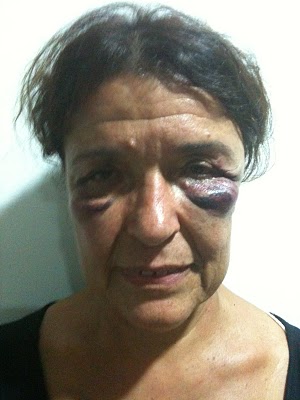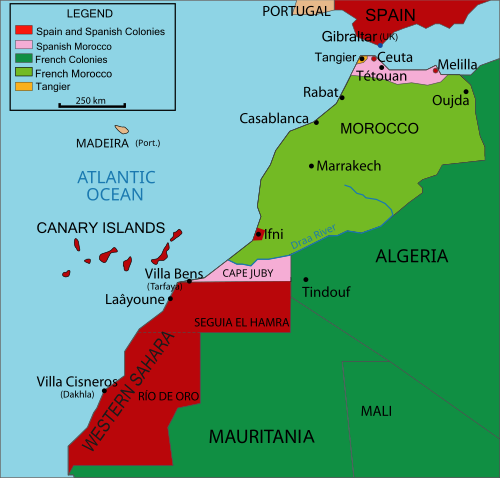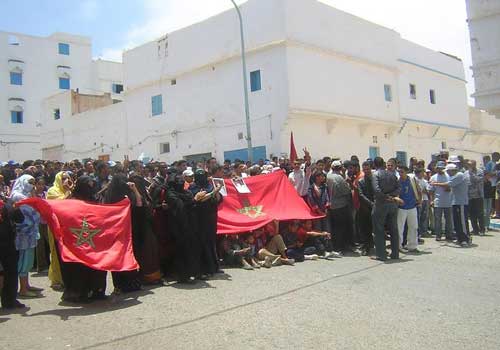Tenerife con el Sahara reports[es] that a number of Canarian citizens have taken part in a protest for the rights of the Arab Democratic Sahrawi Republic at El Aaiun. The reaction of the Moroccan autocracy has been brutal, as usual.

Carmen Roger one of the Canarian victims
After being beaten by the Moroccan occupation forces, the Canarians have been arrested at the "House of Spain". Two international observers, Mexican Antonio Velázquez Díaz and Catalan Isabel Terraza, are being besieged by the occupation forces at the homes of their Sahrawi host family. Tenerife con el Sahara claims that they are at serious risk, as well as the Sahrawi families besieged at their homes by the invader troops.
The international protests are organized by Saharaacciones which is promoting nonviolent protest in order to make the occupation and repression of the West Sahara more visible and hopefully push towards a democratic solution through the right of self-determination of the Sahrawi people:
We are demonstrating to make visible a vetoed territory, where we are unwelcome by the occupation forces, following the example set by the admirable peaceful resistance that the Sahrawi people are doing once and again since the beginning of the Intifada in May 2005.
Morocco may be pushing for greater involvement of Spain
This is what Pedro Canales argues at El Imparcial newspaper (found at Sahara Libre). According to him, Morocco wants Spain to take a more clear pro-Moroccan stand in regards to the West Sahara, a former Spanish province. As Spain cannot really control the high level of popular support for the Sahrawi cause, which is generally perceived as a treason to the formerly "Spanish" people of the Sahara by Madrid, nor can reign on the local and regional administrations in this matter, Morocco seems to have opted to do the same: leave the Moroccan popular discontent with Spain on matters such as the colonial outposts of Ceuta and Melilla or the treatment of immigrants, break loose.
However Canales seems to be writing for the Moroccan viewpoint and seems to think that greater Spanish involvement alone could change things. This is not possible because Spain already has a very shameful role by mere inhibition and cannot really take any stronger political stand against the Arab Democratic Sahrawi Republic. So if Spain would get involved, it could only do with a stand at least moderately opposed to Morocco's aspirations, so really Morocco is doing it wrong if Canales is right. After all some border riots at the Melilla fence won't get anyone worried this side of the Strait.
On the other hand, I guess it is always positive when the people, in this case the Moroccan people can express their discontent. It is a positive development that may be in the future will turn against the autocrat of Rabat. If the people can really express their anger and gets organized maybe in the near future we can hope to see a simultaneous solution to both colonial problems: Moroccan occupation of the Sahara and Spanish control of Ceuta and Melilla.
In any case, I don't think that Morocco really wants to press Spain to get itself "more involved" in the conflict of West Sahara because it can only backfire. For Moroccan imperialist interests the best situation is the status quo, with Spain inhibiting itself, what is as pro-Moroccan as it can get.
But that the people organizes itself and gets to speak out loud in any conflict is as such a good development. In an ideal democracy situation all these conflicts would not exist because it'd be up to each local people to self-determine their status and their future.














